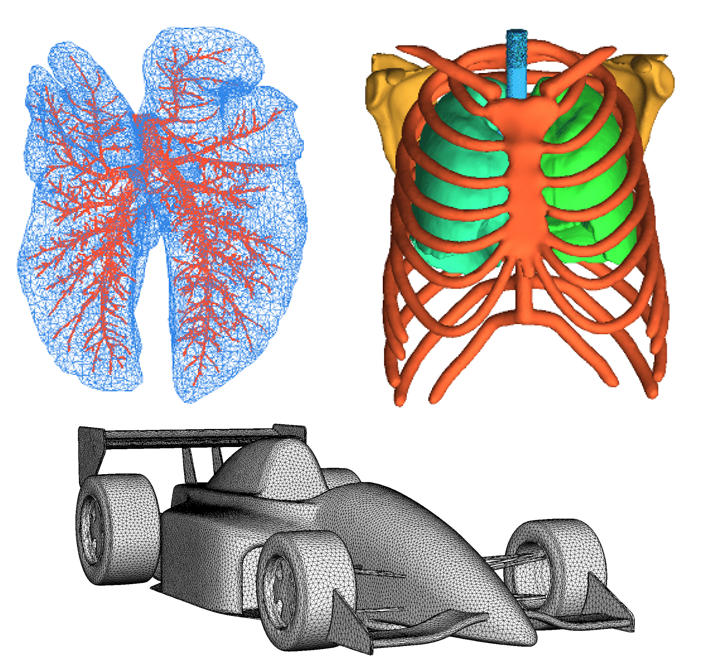
CSC 6991 3D Graphical and Geometric Modeling (Winter 2020)

Important Notices:
Course Information:
Course Ref. No.: 24362
Term: Winter 2020
Time: Tue & Thu 4:00 PM - 5:15 PM
Location: 0075 MANO
Instructor Contact Information:
Name: Zichun Zhong
Phone Number: 313-577-9530
Office Location: 5057 Woodward Ave, Suite 14109.2, Detroit, Michigan, 48202
Office Hours: Tue & Thu 2:00 PM - 3:00 PM
Email Address: zichunzhong@wayne.edu
TA: TBD
Course Description and Goals:

The main focus of the course is to introduce theoretic and computational background of modeling in 3D computer graphics, geometric processing, and visualization, specifically, how to represent, model, and analyze 3D models and scenes. For instance, "how can we build a high-quality model from acquired large-scale 3D dataset in a complex scenario (i.e., scanned data, medical images, unorganized sets of polygons, voxels, etc.)?" and "how can we use the 3D model for reconstruction, simulation, and animation?" The goal of this course is after learning basic computer graphics programming, knowledge, and geometry concepts, students will get to the latest and most popular 3D data representation schemes and techniques; and know how to effectively use them in different graphics, computer-aided design, simulation, or animation applications. The following topics will be covered:
Lecture Notes: (All slides and reference materials are posted on Canvas at WSU)
Syllabus (Check it on Canvas)
Blue color is done
|
Date |
Subject |
|
01/07/2020 |
Introduction to 3D Graphical and Geometric Modeling and Applications |
|
01/09/2020 |
Introduction to Computer Graphics and OpenGL |
|
01/14/2020 |
Representation of 3D Shapes |
|
01/16/2020 |
Mesh Data Structure |
|
01/21/2020 |
3D Surface Mesh Generation |
|
01/23/2020 |
3D Surface Mesh Generation |
|
01/28/2020 |
3D Surface Mesh Generation |
|
01/30/2020 |
3D Surface Mesh Generation |
|
02/04/2020 |
Proposal Discussion |
|
02/06/2020 |
Proposal Discussion |
|
02/11/2020 |
3D Volume Mesh Generation |
|
02/13/2020 |
3D Volume Mesh Generation |
|
02/18/2020 |
Reconstruction of 3D Meshes from Images, such as CT / MRI Medical Images |
|
02/20/2020 |
Reconstruction of 3D Meshes from Point Clouds |
|
02/25/2020 |
Reconstruction of 3D Meshes from Point Clouds |
|
02/27/2020 |
Reconstruction of 3D Volume Images from 2D Projections |
|
03/03/2020 |
Reconstruction of 3D Volume Images from 2D Projections |
|
03/05/2020 |
No Class |
|
03/10/2020 |
Spring Break - No Class |
|
03/12/2020 |
Spring Break - No Class |
|
03/17/2020 |
Spring Break - No Class |
|
03/19/2020 |
Spring Break - No Class |
|
03/24/2020 |
Mid-Term Presentation (online) |
|
03/26/2020 |
Mid-Term Presentation (online) |
|
03/31/2020 |
Simplification of 3D Meshes (online) |
|
04/02/2020 |
Subdivision Surfaces (online) |
|
04/07/2020 |
3D Deep Learning on Shapes (online) |
|
04/09/2020 |
No Class (Self-Study) |
|
04/14/2020 |
Final Presentation and Demo (online) |
|
04/16/2020 |
Final Presentation and Demo (online) |
Grading:
(1) Proposal: 10% (Due date: 02/06/2020)
- Study a set of relevant papers (3-5 papers)
- Submit your own 1-2 page course project proposal
(2) Mid-term report and presentation: 10% (Due date: 03/26/2020)
- Submit your own mid-term report and implement basic functionalities and user interface before the mid-term check point
- Give a class presentation
(3) Final presentation and demo: 20% (Due date: 04/16/2020)
- Give a class presentation and final project demonstration
(4) Project (submit code and final report): 60% (Due date: 04/16/2020)
Prerequisites: This is a graduate-level course. But undergraduate students would still be able to take this course. Some basic background in linear algebra and programming (CSC 2000 or equivalent) is assumed. Knowledge about computer graphics (CSC 5870) and geometry will be helpful.
Course & Instructor Policies:
(1) Copying source code from another student in this class or obtaining a solution from some other source will lead to an automatic failure for this course and to a disciplinary action. In this case, you may be given a score of 0 for the assignment or project in question (and the other party will get a failure).
(2) No late submission for assignment will be accepted.
(3) Grades will be posted on the Canvas.
(4) If there is any special case, please inform the instructor in advance.